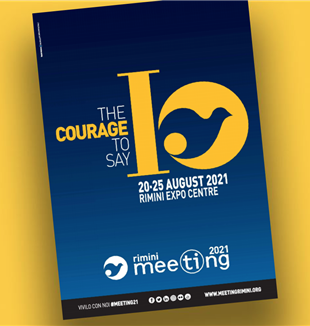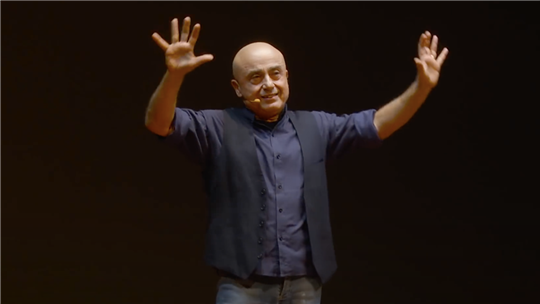
Meeting 2021: in search of a master
Just a few weeks left to the opening of the 42nd edition of the Rimini event, but it is not too early for a taste of what is to come. A brief look at what ‘shows’ are in this year’s program.Days spent at home, loved ones mourned from a distance, friendships cultivated online, jobs lost or done in slippers. “Hidden" experiences that have become common to us all, as only happens during great events in history. At the dawn of the First World War, Russian critic Šklovksij perceived the possibility that life, even in the most dramatic circumstances, might pass by in a mechanical way: "Art exists to help us recover the sensation of life; it exists to make us feel things, to make the stone stony.” If this is the task of art, "the first condition for every communication of truth," says Kierkegaard, "is unconditionally that of personality, the courage to say I." This is the phrase that inspired the title of the 2021 Rimini Meeting. How can we find the courage to say "I" in a year of hidden life, of remote experiences? What do art, music and theater have to say about this?
The word “hidden” appears once in the program of the scheduled shows, in the title of Terrence Malick's latest film: The Hidden Life, which will be screened during the Meeting. The film's protagonist is Franz Jägerstätter, an Austrian farmer beatified by Benedict XVI in 2007. In April 1938, in the small village of Sankt Radegund, Jägerstätter was the only person to vote against the Anschluss. Nazi rule seemed inevitable, automatic, but one man, with no apparent bearing on history, opposed it. And when the judge promised him freedom in exchange for a simple signature, he replied, "But I am free." The support of this freedom, the courage to say ‘I’, implies the need to address a ‘you’, such as Franz's wife Fani and the interlocutor to whom he addresses the verses of the Psalms: "You our light... darkness is not dark to you.”
The choice of the proposals of the 42nd edition is based precisely on this intuition, that is, that the "courage to say I" arises from the need to address a "you". In this year’s program, we see this need to search for masters spelled out, drawn first of all from tradition.
A first name that appears in the program is that of Rachmaninov whose Preludes will be performed on Tuesday, August 24 at 9 pm (CEST). In the Russian pianist, the same need to be in relationship emerges: "A composer’s music should express the country of his birth, his love affairs, his religion, the books which have influenced him, the pictures he loves. It should be the product of the sum total of a composer’s experience.” This reference to tradition will also be touched upon from a literary point of view, in Dante: director Marco Martinelli and actress and set designer Ermanna Montanari will perform a "choral" show centered on the first two Cantos of the Inferno. The great poet, whose 700th anniversary of death is celebrated this year, embodies the journey of a crisis and the appeal to a "you" – Virgil, his first encounter in The Divine Comedy.
This glimpse at tradition is met, however, by the need to search for a master to look at in the present. For this reason, the first event, on Friday, August 20 at 10 pm (CEST), maestro Uto Ughi will perform Antonio Vivaldi's Four Seasons, accompanied by various young talents. The relationship with masters is also the basis of the great novelty of this year’s edition: the Meeting Music Contest, a music competition that will conclude on August 25 in Piazza Malatesta, decided by the panel of honor composed of Lorenzo Baglioni, N.A.I.P, Erica Mou and Federico Mecozzi. The young violinist from Rimini, who despite his age boasts many years of collaboration with the composer and pianist Ludovico Einaudi (with whom he performed the soundtrack for Nomadland), will perform in a concert on Sunday, August 22, presenting his new album Awakening. In a similar vein will be the conversation between Pupi Avati and young people, centered around the topic of talent – that which is most precious and which is hidden.
Also “hidden" is the story of the main character of Luca Doninelli's play, Il sogno di Giuseppe [Joseph’s Dream]. The archangel Gabriel appears in a dream to Saint Joseph, but for this to happen he needs to sleep: how could he sleep after the news that Mary had given him? Joseph's dream that night is a greater miracle than the reign of Solomon, of David, of the parting of the waters of the Red Sea. All of this is nothing compared to the peace of that man, and all of this, since Abraham, has served to produce a man "so righteous and upright that he slept that night."
Read also – Cascinazza: Fifty years like the first day
Paolo Cevoli will also share his experience as a father; in his show La Sagra Famiglia [The Holy Family] he compares himself to classical figures such as Achilles, Aeneas, Oedipus and Ulysses, up to the prodigal son. #Meeting2021